How was your school trip 学案
Unit 4 How was your school trip-教案

Unit 4 How was your school trip?教案Unit 4 How was your school trip?一、教学内容:Unit 4 How was your school trip?(一)重点单词(二)重点短语(三)重点句型(四)中考链接(五)写作二、知识总结与归纳(一)重点单词g2. hangwvutdddrive10. raluckily12. umbrellawutuagain(二)重点短语gaquarium 去水族馆2. hang out (with sb.) ( 和某人) 闲荡;闲逛buya souvenir 买一个纪念品get one’s autograph 得到某人的签名win a prize 获奖ave a great time 玩得高兴;过得愉快ad of 在……结束时ake a class 上leep late 睡过头;起得晚10. go for a drive 开车去兜风day off 休息;不工作;不上学have a day off “休一天假”,have two daysoff“休两天假” on one’s day off “在某人的休假日”12. sound lave fun doing sth. 做某事很开心all day 整天a yard sale 庭院旧货出售’某人认为uture将来(三)重点句型How was your school trip?你们学校组织的郊游怎么样?2. —Wany… ? 有……吗?—Nweren’t, buw不,没有,但有一些……—Did you g…? 你去……了吗?—No, I didn’t. 不,我没去。
What else did you do? 你还做了别的什么事?an you believe it? 你相信吗?I… 我认为……aria wday’s singing玛丽亚在昨天的歌唱比赛中获得了一等奖。
How was your school trip教案
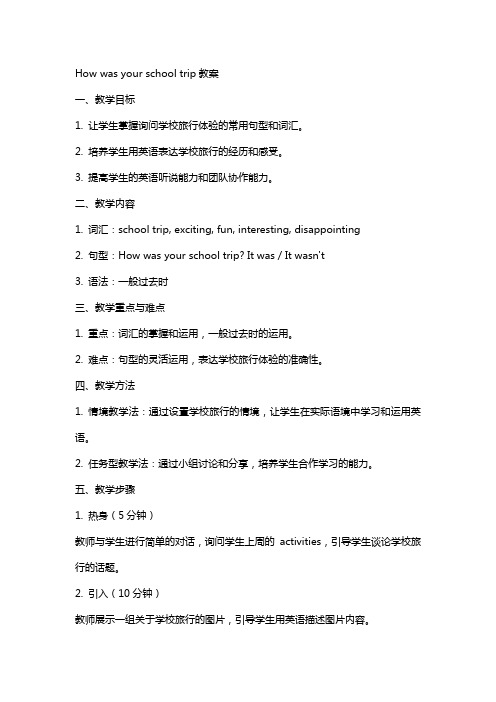
How was your school trip教案一、教学目标1. 让学生掌握询问学校旅行体验的常用句型和词汇。
2. 培养学生用英语表达学校旅行的经历和感受。
3. 提高学生的英语听说能力和团队协作能力。
二、教学内容1. 词汇:school trip, exciting, fun, interesting, disappointing2. 句型:How was your school trip? It was / It wasn't3. 语法:一般过去时三、教学重点与难点1. 重点:词汇的掌握和运用,一般过去时的运用。
2. 难点:句型的灵活运用,表达学校旅行体验的准确性。
四、教学方法1. 情境教学法:通过设置学校旅行的情境,让学生在实际语境中学习和运用英语。
2. 任务型教学法:通过小组讨论和分享,培养学生合作学习的能力。
五、教学步骤1. 热身(5分钟)教师与学生进行简单的对话,询问学生上周的activities,引导学生谈论学校旅行的话题。
2. 引入(10分钟)教师展示一组关于学校旅行的图片,引导学生用英语描述图片内容。
3. 新课内容(15分钟)教师讲解新词汇和句型,让学生用英语表达学校旅行的经历和感受。
4. 实践环节(10分钟)学生分组讨论,分享彼此的学校旅行经历,用英语表达感受。
教师巡回指导,纠正发音和语法错误。
5. 总结与作业(5分钟)教师总结本节课的主要内容和知识点,布置作业:用英语写一篇关于学校旅行的短文。
6. 拓展活动(可选,时间自定)组织学生进行角色扮演,模拟学校旅行的场景,提高学生的英语口语表达能力和应变能力。
六、教学评估1. 课堂参与度:观察学生在小组讨论中的参与程度,以及他们的英语听说能力。
2. 语言准确性:注意学生在表达学校旅行体验时语言的准确性,包括词汇和语法的使用。
3. 作业完成情况:评估学生关于学校旅行的短文,检查他们对课程内容的理解和应用。
七、作业布置1. 学生需完成一篇关于学校旅行的短文,要求使用一般过去时,并正确运用本节课学习的词汇。
How was your school trip 学案
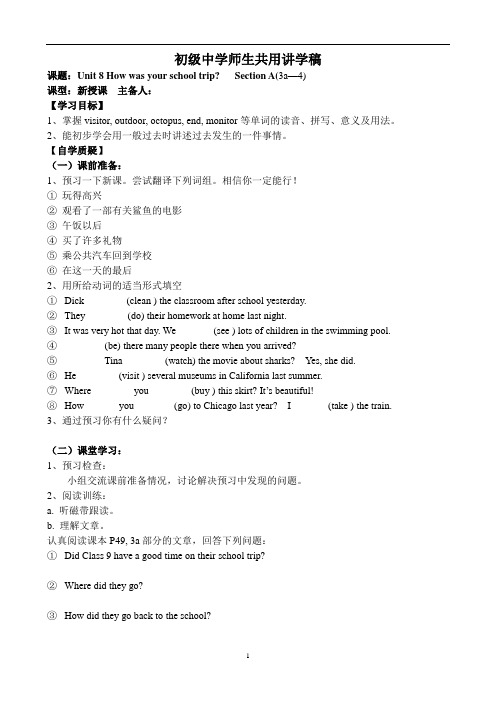
初级中学师生共用讲学稿课题:Unit 8 How was your school trip? Section A(3a—4)课型:新授课主备人:【学习目标】1、掌握visitor, outdoor, octopus, end, monitor等单词的读音、拼写、意义及用法。
2、能初步学会用一般过去时讲述过去发生的一件事情。
【自学质疑】(一)课前准备:1、预习一下新课。
尝试翻译下列词组。
相信你一定能行!①玩得高兴____________________②观看了一部有关鲨鱼的电影________________③午饭以后______________________④买了许多礼物______________________⑤乘公共汽车回到学校_____________⑥在这一天的最后_________________________2、用所给动词的适当形式填空①Dick ________(clean ) the classroom after school yesterday.②They ________(do) their homework at home last night.③It was very hot that day. We _______(see ) lots of children in the swimming pool.④________(be) there many people there when you arrived?⑤________Tina ________(watch) the movie about sharks? Yes, she did.⑥He ________(visit ) several museums in California last summer.⑦Where ________you ________(buy ) this skirt? It’s beautiful!⑧How ______ you _______ (go) to Chicago last year? I _______(take ) the train.3、通过预习你有什么疑问?___________________________________________________________________ (二)课堂学习:1、预习检查:小组交流课前准备情况,讨论解决预习中发现的问题。
七年级下Unit-11How-was-your-school-trip教案

Unit 11How was your school trip?第一课时Section A (1a-1c)1.重点单词:milk,cow,horse,feed,farmer,quite2.重点短语:go for a walk, milk a cow, ride a horse, feed chickens, talk with a farmer, take some photos, quite a lot3.重点句式:—Did you see any cows?—Yes, I did. I saw quite a lot.—Did you ride a horse?—No, I didn't. But I milked a cow.1.掌握一般过去时态2.掌握一般过去时态中动词过去式的变化规则1.掌握一般过去时态2.掌握一般过去时态中动词过去式的变化规则一、预习课本P61新单词并识记,完成下面的汉译英。
1.挤奶__________ 2.奶牛__________3.马__________ 4.喂养__________5.农民__________ 6.相当__________二、认真预习1a,1b和1c,找出下列短语和句型。
1.去散步________________________________________________________________________ 2.给奶牛挤奶________________________________________________________________________ 3.骑马________________________________________________________________________ 4.喂鸡________________________________________________________________________ 5.和农民交谈________________________________________________________________________ 6.照一些相片________________________________________________________________________ 7.你见过奶牛吗?是的,我见过很多。
How was your school trip完整版教案

2)形容词adj. excellent, clean
3)动词v. milk, feed, grow, pick
4)副词adv. quite
5)代词pron. anything
2.句型:Did you see any cows? Yes, I did. I saw quite a lot.
Did you ride a horse? No, I didn’t. But I milked a cow.
What did Carol do? Were they good?
课后反思
课时安排
第2课时
课时目标
Teaching aims(教学目标)
1.能熟练的和他人使用一般过去时谈论过去发生的事。
2.动词过去式的规则变化与不规则动词的变化。
(2)Check Ss’ answers.
S1:I usually play computer games.
S2: I usually watch TV.
Please read
go for a walk - went for a walk
milk a cow - milked a cow
ride a horse - rode a horse
feed chickens - fed chickens
talk with a farmer - talked with a farmer
take some photos - took some photos
(1) Listen and circle the three things Carol did on her school trip in 1a.
Unit-11-How-was-your-school-trip教案

Unit 11 How was your school trip?1. Target language—How was your school trip? — It was great.—Did you go to the zoo? —Yes , Yes, I did. /No, I didn't.—Were the strawberries? —Yes, they were.words , phrases & sentences. regular verb, irregular verb2. Key sentences—How was your school trip? — It was great.—Did you go to the zoo? —Yes, Yes, I did. /No, I didn't.3. Teaching important / difficult pointsHow to listen to and talk about recent past events.4. StructuresSimple past tense; How questions; Yes/No questions and short answers; Adjectives of description.5. Difficulties Simple past tense.6. Importance How to listen to and talk about recent past events7.Teaching aids A tape recorder. Some picture. CAI.8. Periods Four periods.Period 1 (Section A: 1a-1c)Step I Warming up and lead-inGreet the students and talk about weekend activities with them.T: Hello! Everyone. Today we’ll learn to talk about recent past events. Now first please tell me what you often do on weekends.S1: I often play basketball on weekends.S2: I often watch TV.T: (Point to the word “weekend”) What does this word mean?S: Saturday and Sunday are the weekend.S1: I played basketball last weekend.S2: I cleaned my room last weekend.Step II Talking about the picture (1a)1. Ask the students to match the words with the pictures.Check the answers.T: Look at the picture. What did each person in the picture do?S1: She played tennis.S2: She did homework.2. Ask the students to talk about the picture in 1aT: Now please look at the picture on page 53. Suppose you are Lucy in the picture. What did you do last weekend in Picture a?S1: I went to the movies.T: What did you do last weekend in Picture b?S2: I played soccer / football.T: Please ask and answer in pairsStep III Listening and speaking (1b, 1c)1. Ask the students to listen to the conversation and fill in the blanks in the picture.Check the answers.2. Ask the students to read the conversation in 1c and then make conversations in pairs.Sample conversations:S1: What did you do last weekend, Lucy?S2: On Sunday morning, I played tennis.Ask the students to make their own conversations. Show the following.—What did you / he / she / they do last weekend / last Sunday morning / last Monday / yesterday?—I / We / He / she / They went to the beach / played computer games / did my homework / cleaned my room / went to the movies.Step Ⅳ Homework1. Ask the students to do Exercises 1 & 2 in the workbook.2. Ask the students to learn the new words and expression.教学反思:______________________________________________________________________________ ______________________________________________________________________________ ______________________________________________________________________________ ______Period 2 (Section A: 2a-2d)Step I Revision and lead-inCheck the homework.T: Today we’ll go on talking about the recent past events. We know when we talk about the things we did in the past, we must use the past forms of the verbs. For example: clean→cleaned; visit→visited; look→looked; study→studied; do→did; have→had; go→went. Now read after me these words.Then ask the students what they did last weekend.T: What did you do last weekend?S1: I played football last weekend.S2: I did my homework last weekend.S3: I cleaned my room last weekend.T: Well! What did your brother do last weekend?S4: He watched TV last weekend.S5: He went to the movies last weekend.Step II Listening (2a, 2b)1. Listen to the recording and underline the words.T: OK. Do you know what Carol, Ben and Emma did last weekend? Now let’s li sten to a conversation between a teacher and three students. They will talk abot some of the activities and people, but they will not talk about others. Please under-line the words you hear on the recording.Then check the answers.2. Ask the students to listen and write.Check the answers.3. Ask the students to listen to and repeat the conversation after the recording. Step III Pairwork (2c)1. Ask the students to practice the conversation.Ask the students to read the words repeatedly.Ask the students to ask and answer in pairs.Sample conversations:1) S1: What did you do last weekend?S2: I visited my grandmother.S1: What about your friend, Carol?S2: She went to a bookshop. What did you do?S1: I stayed at home and did some reading.2. Ask the students to make conversations.Step IV GrammarAsk the students to read the sentences in the Grammar Focus and underline the verbs in them.Show the following.What did you do last weekend?I played soccer. We went to the beach. She did her homework. He went to the movie. They played tennis.T: The underlined parts in these sentences are called past form. And in English they formed the simple past tense. The simple past tense is one of the most common tenses in English. We use the simple past to refer to an action in the past that is finished. Step V Homework1. Ask the students to learn more past forms of irregular verbs in the dictionary.2. Ask the students to read a short story and pay attention to the verb forms in the story.教学反思:______________________________________________________________________________ ______________________________________________________________________________ ______________________________________________________________________________ __Period 3 ( Section A: 3a-3c)Step I RevisionAsk the students to complete the part of the story from Cinderella.Check the answers by asking some students to read the part of the story. The students may meet some new words during the reading, ask them to try to guess the meaning. T: As we can see, nearly all the verbs are in past forms in the story. In fact, when we keep diary, we always use the simple past.Step II Lead-inTalk about recent past events with the students.T: Good! Now answer my question: What did you do last weekend?S1: I watched TV at home last weekend.S2: I stayed at home last weekend.S3: I played basketball last weekend.T: Well done, everyone. You did many interesting things. But I stayed at home last weekend. I did much housework. I cleaned my room. I washed my clothes. It was not very good, because I was very tired. Now answer: How was your weekend?Help them answer.Ss: It was great / good / OK...Write down and get the students to read the dialogue:—How was your weekend? —It was great.Step III Reading and speaking (3a)1. Ask the students to describe what each person in each scene did.T: Look at the picture in 3a. Tell me what the person in each scene did.S1: In Picture 1: She went to the beach.S2: In Picture 2: He did his homework and watched TV.S3: In Picture 3: She cleaned her room and studied for the math test.2. Ask the students to read the expressions and the conversations.T: Now please read the expressions above the picture and the conversations in the picture. The second part of each conversation is incomplete. They are listed above the picture. Read them and write the correct number on the blank lines in the speech bubbles to complete the conversations.Then check the answers by asking some students to read the completed conversations. Step IV Pairwork (3b)1. Ask the students to read the conversation in 3b first. And then ask them to make conversations.T: Now practice asking and answering questions about what the people in the pictures did last weekend. Practice in pairs. Use the dialogue as an example. Give the students two minutes to read and make the conversations.A: How was Sarah’s weekend?B: It wasn’t ver y good. She cleaned her room and studied for the math test. Sample conversations:1) S1: How was Tony’s weekend?S2: It was OK. He did his homework and watched TV.2) S3: How was Sa rah’s weekend?S4: It wasn’t very good. She cleaned her room and studied for the math test. Step Ⅴ HomeworkAsk the students to finish the exercises.教学反思:_______________________________________________________________________________ _______________________________________________________________________________ _______________________________________________________________________________ __Period 4 ( Section B: 1a-2c)Step I Revision and lead-inCheck the homework.T: Hi, class! Nice to see you again in a new day. Did you finish your homeworkyesterday?S: Yes, we did.T: Good. Who’d like to show us your answers?Ask some students to read the answers and the story. Key to the homework in Period 3:I. 1. got, yesterday morning 2. didn’t do3. What did, do4. How was5. wasII. went, sat, was, was, opened, was, said, said, said, put on, looked, went, was, was, asked, danced, said, was, forgot, rang, said, ran, lost, was, was, didn’t know, lived, went, said, went, opened, said, said, was, wereThen ask the students the following questions.T: What did your parents do yesterday?S1: My mother did some reading and my father watched TV.S2: My father played computer games and my mother helped me with my English.S3: My parents went to visit one of their old friends.T: OK! Look at the pictures. Could you tell me what Lucy did yesterday?S1: She watched TV yesterday.S2: She cooked at home yesterday.S3: She cleaned the car with her friends yesterday.S4: She studied geography yesterday.Help to answer and read the new word geography.Step II Reading and writing (1a, 1b)1. Ask the students to match the words with the pictures in 1a.T: Jim studied geography yesterday, too. He also did other things. Now open your books and turn to page 56. Look at the pictures in 1a. Read the words and then write the letter of each picture in the blank in front of the correct phrase.Check the answers.T: Right. Now ask and answer in pairs, using the question: What did Jim / Sally do yesterday?Sample conversations:1) S1: What did Jim do yesterday?S2: He did his homework.2) S3: What did Sally do yesterday?S4: She played the guitar.2. Ask the students to draw a happy face or an unhappy face under each picture. Help to answer.S: No. I think doing homework is an unhappy thing.T: What about playing the guitar?S: It’s a happy thing.T: In Picture b, the boy played the guitar. It was fun. The happy face shows it was fun. Now please draw a happy face or an unhappy face under each picture a, c and d.Check the answers.Step III Listening (2a)1. Ask the students to listen to the conversation Sally and Jim and write the answers in the chart.Check the answers.Play the recording and ask the following questions.T: First, what did Sally do last weekend?S1: She stayed at home and did lots of things. She cleaned her room and did her homework. And on Sunday, she went to the library.T: Good. What about Jim? What did Jim do last weekend?S2: He played soccer on Saturday morning. On Sunday afternoon, he went to a movie. On Sunday night, he visited his friend’s house.2. Ask the students to repeat after the recording line by line and try to write them down.T: I will play the recording twice again. First repeat after the recording and then try to write the conversations down.Step IV Pairwork (2b, 2c)1. Ask the students to read the dialogue first. And then make a conversation.2. Ask the students to talk about what they did last weekend.3. Then ask the students to write down what they did last weekend.T: OK. You did very well. Now please write down what you did last weekend. Give the students two or three minutes to write.Step V Homework1. Ask the students to do Exercise 6 in the workbook.2. Ask the students to write something about what they did last week.教学反思:______________________________________________________________________________ ______________________________________________________________________________ ______________________________________________________________________________ ______Period 5 Section B: 3a-3c)Step I Revision and lead-inT: Today we will go on talking about the past events. We’ll learn an article about how kids spent the weekend. Now can you tell me what you did last weekend? Sample answers:S: Last Saturday I wen t to my aunt’s house. There I played computer games with T: Well done. Now look at the pictures and say what they did yesterday morning? S1: Lucy listened to the radio. Tom did some reading. Bill and Bob played soccer, and Jim went to school by bike.T: Oh! Which school did Jim go to?S2: He went to No. 4 Middle School.Write down the new words: No.=number, middle, middle school. Teach to read the new words.T: Which school are you in?S3: We’re in No. 3 Middle School.Step II Reading (3a)1. Ask the students to read the article, and then answer the following questions.1) How many students did their homework or studied?2) Did two kids visit friends?2. Read the article again and circle the activities you like. Underline the activities you don’t like.3. Explain the key and difficult points in the passage.1) spend 花费,度过(1)spend money on sth 花钱买某物(在……上花钱)。
Howwasyourschooltrip教案(共5则范文)
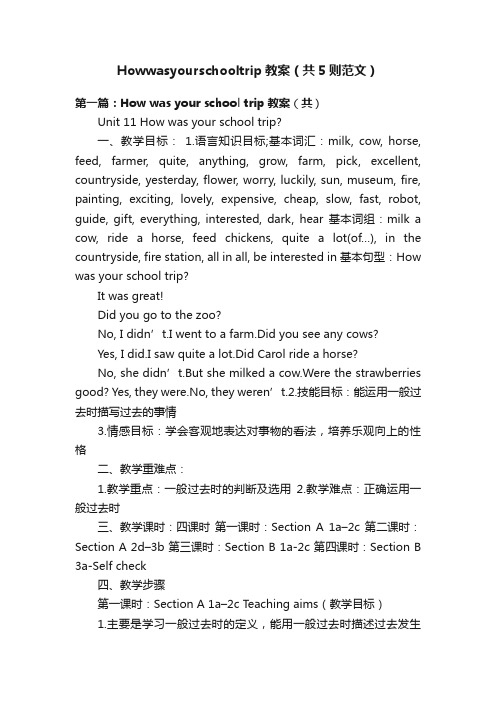
Howwasyourschooltrip教案(共5则范文)第一篇:How was your school trip 教案(共)Unit 11 How was your school trip?一、教学目标:1.语言知识目标;基本词汇:milk, cow, horse, feed, farmer, quite, anything, grow, farm, pick, excellent, countryside, yesterday, flower, worry, luckily, sun, museum, fire, painting, exciting, lovely, expensive, cheap, slow, fast, robot, guide, gift, everything, interested, dark, hear 基本词组:milk a cow, ride a horse, feed chickens, quite a lot(o f…), in the countryside, fire station, all in all, be interested in 基本句型:How was your school trip?It was great!Did you go to the zoo?No, I didn’t.I went to a farm.Did you see any cows?Yes, I did.I saw quite a lot.Did Carol ride a horse?No, she didn’t.But she milked a cow.Were the strawberries good? Yes, they were.No, they weren’t.2.技能目标:能运用一般过去时描写过去的事情3.情感目标:学会客观地表达对事物的看法,培养乐观向上的性格二、教学重难点:1.教学重点:一般过去时的判断及选用2.教学难点:正确运用一般过去时三、教学课时:四课时第一课时:Section A 1a–2c 第二课时:Section A 2d–3b 第三课时:Section B 1a-2c 第四课时:Section B 3a-Self check四、教学步骤第一课时:Section A 1a–2c Teaching aims(教学目标)1.主要是学习一般过去时的定义,能用一般过去时描述过去发生的事情,学会使用一般过去时的陈述句,及一般疑问句和答语。
Unit4_How_was_your_school_trip道学案

Unit 4How was your school trip?助学案第一课时(1a—1c)[教师寄语]A good beginning is half done.良好的开端是成功的一半。
[学习目标]1、学会询问和谈论过去的事情。
2、掌握规则和不规则动词的变化及读音。
[学习过程]一、自主学习礼物_________ shark_________ aquarium__________海豹________闲逛________souvenir________拍照_______写出过去式go ____ hang_____ see____ buy____have_____eat___二、知识点拨1、观察下列对话,总结一般过去式的构成。
---Did you go to the park last Sunday?--- No, I didn’t.---What did you do?--- I went to the aquarium.---Were there any sharks?---No, there weren’t , but there were some seals.2.gift(同义)3.hang______ _______ hang_______ ________观察句子写出过去式及分词。
1)I hung the clothes on the cothing line.2)The man hanged himself.4.take photos=take photos of……同义_______5.There be 的一般过去时态,be的变化跟后面的名词而定,即就近原则。
eg: There wasn’t any chicken and eggs in the bag.三、随堂练习1.I _______(see) some seals in the aquarium.2.___you______(take) pictures in the park?3.I _____(not see) some sharks yesterday.四、优化作业1.He with his friends______(be) at the zoo.2.There ____(be) a lot of trees around our village two years ago.3.He_______(hang) out with his friends.4.He did morning exercise last year.(否定,一般疑问句)5.There were some flowers.(否定,一般疑问句)五、自我展示第二课时(2a---2c) 助学案[教师寄语]A friend is easier lost than found.得朋友难,失朋友易。
how was your school trip 学案
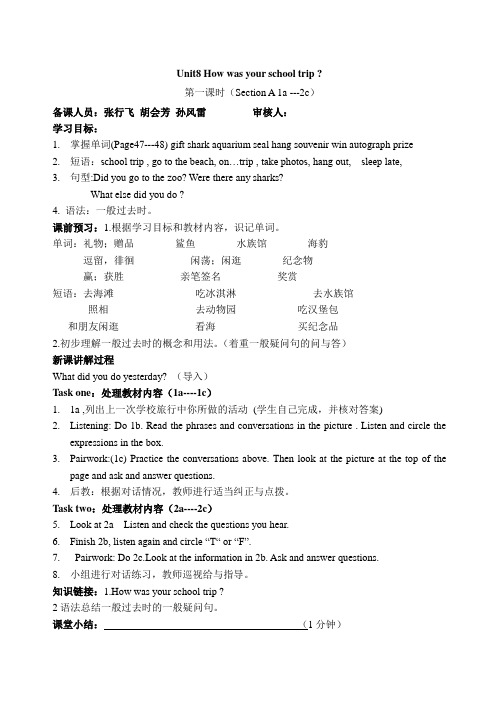
Unit8 How was your school trip ?第一课时(Section A 1a ---2c)备课人员:张行飞胡会芳孙风雷审核人:学习目标:1.掌握单词(Page47---48) gift shark aquarium seal hang souvenir win autograph prize2.短语:school trip , go to the beach, on…trip , take photos, hang out, sleep late,3.句型:Did you go to the zoo? Were there any sharks?What else did you do ?4. 语法:一般过去时。
课前预习:1.根据学习目标和教材内容,识记单词。
单词:礼物;赠品鲨鱼水族馆海豹逗留,徘徊闲荡;闲逛纪念物赢;获胜亲笔签名奖赏短语:去海滩吃冰淇淋去水族馆照相去动物园吃汉堡包和朋友闲逛看海买纪念品2.初步理解一般过去时的概念和用法。
(着重一般疑问句的问与答)新课讲解过程What did you do yesterday? (导入)Task one:处理教材内容(1a----1c)1.1a ,列出上一次学校旅行中你所做的活动(学生自己完成,并核对答案)2.Listening: Do 1b. Read the phrases and conversations in the picture . Listen and circle theexpressions in the box.3.Pairwork:(1c) Practice the conversations above. Then look at the picture at the top of thepage and ask and answer questions.4.后教:根据对话情况,教师进行适当纠正与点拨。
How was your school trip 学案
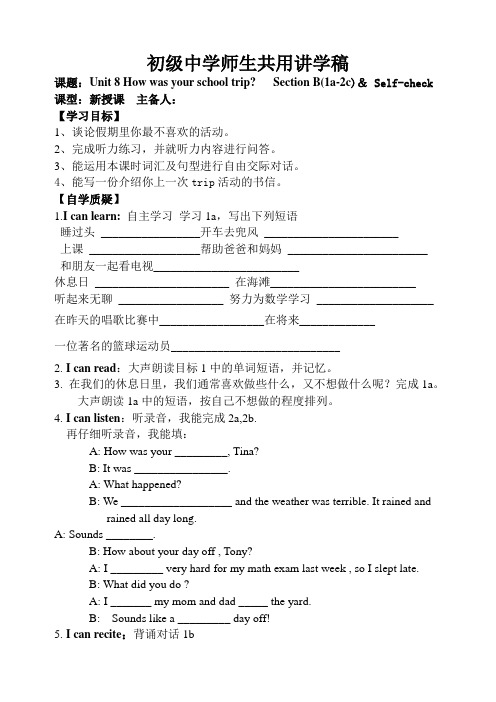
初级中学师生共用讲学稿课题:Unit 8 How was your school trip? Section B(1a-2c)& Self-check 课型:新授课主备人:【学习目标】1、谈论假期里你最不喜欢的活动。
2、完成听力练习,并就听力内容进行问答。
3、能运用本课时词汇及句型进行自由交际对话。
4、能写一份介绍你上一次trip活动的书信。
【自学质疑】1.I can learn: 自主学习学习1a,写出下列短语睡过头_________________开车去兜风_______________________上课___________________帮助爸爸和妈妈________________________和朋友一起看电视_________________________休息日_______________________ 在海滩_________________________听起来无聊__________________ 努力为数学学习____________________ 在昨天的唱歌比赛中__________________在将来_____________一位著名的篮球运动员_____________________________2. I can read:大声朗读目标1中的单词短语,并记忆。
3. 在我们的休息日里,我们通常喜欢做些什么,又不想做什么呢?完成1a。
大声朗读1a中的短语,按自己不想做的程度排列。
4. I can listen:听录音,我能完成2a,2b.再仔细听录音,我能填:A: How was your _________, Tina?B: It was ________________.A: What happened?B: We ___________________ and the weather was terrible. It rained and rained all day long.A: Sounds ________.B: How about your day off , Tony?A: I _________ very hard for my math exam last week , so I slept late.B: What did you do ?A: I _______ my mom and dad _____ the yard.B: Sounds like a _________ day off!5. I can recite:背诵对话1b6. I can write: 完成Self-check第一部分练习。
Unit 4 How was your school trip-教案
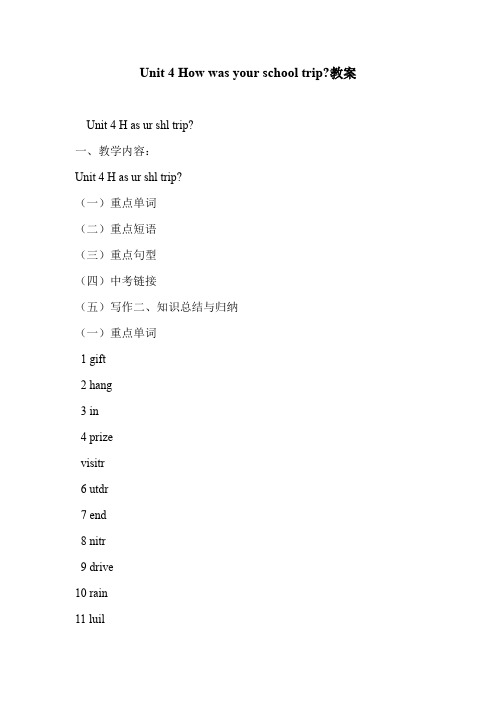
Unit 4 How was your school trip?教案Unit 4 H as ur shl trip?一、教学内容:Unit 4 H as ur shl trip?(一)重点单词(二)重点短语(三)重点句型(四)中考链接(五)写作二、知识总结与归纳(一)重点单词1 gift2 hang3 in4 prizevisitr6 utdr7 end8 nitr9 drive10 rain11 luil12 ubrella13 et14petitin1 future16 again(二)重点短语1 g t the aquariu 去水族馆2 hang ut (ith sb) ( 和某人) 闲荡;闲逛3 bu a suvenir 买一个纪念品4 get ne’s autgraph 得到某人的签名in a prize 获奖6 have a great tie 玩得高兴;过得愉快7 at the end f 在……结束时8 tae a lass 上9 sleep late 睡过头;起得晚10 g fr a drive 开车去兜风11 da ff 休息;不工作;不上学have a da ff “休一天假”,have t das ff“休两天假” n ne’s da ff “在某人的休假日”12 sund lie13 have fun ding sth 做某事很开心14 all da 整天1 a ard sale 庭院旧货出售16 in ne’s pinin 某人认为17 in the future 将(三)重点句型1 H as ur shl trip?你们学校组织的郊游怎么样?2 —ere there an… ? 有……吗?— N, there eren’t, but there ere se 不,没有,但有一些……3 —Did u g t the…? 你去……了吗?—N, I didn’t 不,我没去。
Unit-11-How-was-your-school-trip-导学案
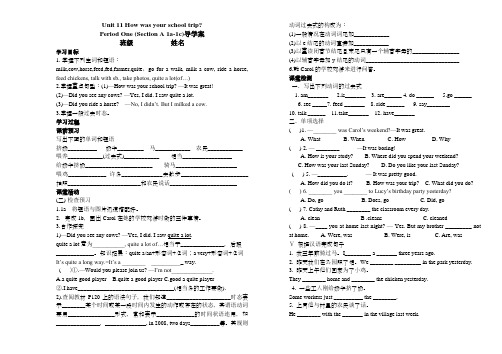
Unit 11 How was your school trip?Period One (Section A 1a-1c)导学案班级姓名学习目标1.掌握下列生词和短语:milk,cow,horse,feed,fed,farmer,quite,go for a walk, milk a cow, ride a horse, feed chickens, talk with sb., take photos, quite a lot(of…)2.掌握重点句型:(1)—How was your school trip? —It was great!(2)—Did you see any cows? —Yes, I did. I saw quite a lot.(3)—Did you ride a horse? —No, I didn’t. But I milked a cow.3.掌握一般过去时态。
学习过程课前预习写出下面的单词和短语挤奶__________ 奶牛_________ 马____________ 农民____________ 喂养____________(过去式)____________ 相当_________________给奶牛挤奶_______________________ 骑马_____________________喂鸡_____________ 许多______________去散步_______________________ 拍照_________________________和农民说话_______________________课堂活动(二)检查预习1.1a 将短语与图片迅速搭配好。
2.完成1b,圈出Carol在她的学校郊游时做的三件事情。
3.合作探究1)—Did you see any cows? —Yes, I did. I saw quite a lot.quite a lot意为___________, quite a lot of…相当于_______________,后跟_____________。
how was your school trip学案

七下Unit 4 How was your school trip?【学习目标】1. 掌握本单元单词及短语。
2. 会运用一般过去时来谈论过去发生的事情与经历。
【语言目标】How was your school trip?What did you do?When did you take a trip?Who did you go with?Did you take any photos?Was/ Were there----?【学习重难点】会运用一般过去时来谈论过去发生的事情。
【过程与方法】采用任务型教学法,通过checking,Pair_work,group work,等引导学生开展活动。
【基础过关】吃透课本任务一.词汇过关(一.)写出下列动词的一般过去式(1) watch- (2) visit- (3)play-(4) live- (5) move- (6)put-(7) study- (8)worry- (9)cry-(10)stop- (11)plan- (12)shop-(13)am,is- (14)go- (15)do-(二.)用所给动词的适当形式填空。
1. Listen! Mary _________ ( sing) now.2. A young man __________ (run) on the playground now.3. My mother _________(watch) TV play every day.4. Old Bush ________(visit) China again last month.5. I ______ (play) sports three times a day.6. Look! Lucy and Lily ____________(read) books.7. There _______(is) a football match yesterday afternoon.8. Our class ______( go) to the zoo three days ago任务二Pair_work跟踪训练:完成下面对话。
unit11-How-was-your-school-trip教案

Unit11 How was your school trip?第一课时:Teaching goals:Ss master the words about farming.Ss can have a biref understandig of the past tense.Ss can talk about the things they did on their school trip. Teaching Important Points:the farming words; the sentence patern”Did you …”. Teaching Difficult Points:the farming words; finish the exercises by listening Teaching Aids:book tape PPT chalk blackboardBlackboard Design:went for a walk Did you see any cows?milked a cow Yes, I did. I saw quite a lot. rode a horse Did you ride a horse?fed chickens No, I didn’t. But I milked a cow. talked with a farmertook some photosTeaching Procedures:Step1: Lead-in.Two questions: Do you have any school trip?What did you do on your school trip?How did you feel about it?Let ss become interested in the farming work.Step2: Learn new words.1.show the farming words by PPT.Teacher---lead to readStudents-----read in a rowThe right---the present tense left—the past tenseMake ss write down the present tense of these verbs.2. exercises about these words.Finish 1a, Match the phrases with the pictures.Pair check------class checkStep3: Do the listening11.Listen and circle the three things Carol did on her school trip.2.:Listen and repeat.3. Role-play Girls: A Boys: B4. circle some sentences in the listening material,What rules can you find?Did 出现必须用动词原形;陈述句用动词的过去式表示。
Unit-11-How-was-your-school-trip--整单元教案Word版
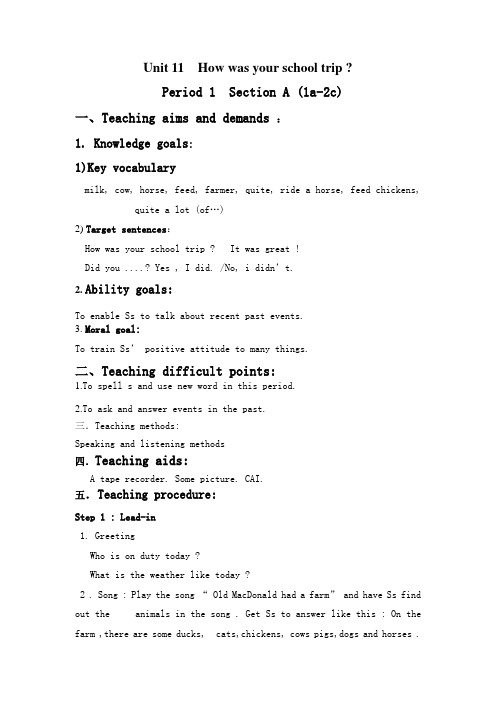
Unit 11 How was your school trip ?Period 1 Section A (1a-2c)一、Teaching aims and demands :1. Knowledge goals:1)Key vocabularymilk, cow, horse, feed, farmer, quite, ride a horse, feed chickens, quite a lot (of…)2)Target sentences:How was your school trip ? It was great !Did you ....? Yes , I did. /No, i didn’t.2.Ability goals:To enable Ss to talk about recent past events.3.Moral goal:To train Ss’ positive attitude to many things.二、Teaching difficult points:1.To spell s and use new word in this period.2.To ask and answer events in the past.三.Teaching methods:Speaking and listening methods四.Teaching aids:A tape recorder. Some picture. CAI.五.Teaching procedure:Step 1 : Lead-in1. GreetingWho is on duty today ?What is the weather like today ?2 . Song : Play the song “ Old MacDonald had a farm” and have Ss find out the animals in the song . Get Ss to answer like this : On the farm ,there are some ducks, cats,chickens, cows pigs,dogs and horses .They are animals.3.Get Ss to watch the screen and ask :What did I do on National Days?Help Ss answer:You went for a walk.Teach other phrases in the same way and teach how to read them.Step2: Practice 1aMatch the phrases with the pictures and get Ss to read them fluently.Step 3 listening 1bSs read the conversation in 1b before listening.Play the tape for the first time , and listen again and circle the three things Carol did on her school trip in 1a.Then check the answers.Step 4 Practice 1cAsk the students to read the conversation in 1c and then makeconversations in pairs.Sample conversations:S1: What did you do last weekend, Lucy?S2: On Sunday morning, I played tennis.Ask the students to make their own conversations. Show the following.—What did you / he / she / they do last weekend / last Sunday morning / last Monday / yesterday?—I / We / He / she / They went to the beach / played computer games /did my homework / cleaned my room / went to the movies.Step 5 Listening 2a-2bListen and check the questions you hear in 2a and check the answers.Listen again.Circle T for true or F for false and check the answers.Step 6 PracticeGet Ss to ask and answer questions about Carol’s visit to the farm like this :A: What did Carol do ?B: She picked some strawberries.Step 7 HomeworkReview verb phrases in this period.教学反思:Period 2 Section A 2d-3b一、Teaching aims and demands :1. Knowledge goals:1)Key vocabularyanything, grow, farm, pick, excellent, countryside, in the countryside, clean,yesterday, flower, worry, luckily, sun, fire station,all in all, be interested in2)Target sentences:Did you go to the zoo ? No, I didn’t. I went to a farm.3)Grammar: The Simple Past Tense2.Ability goal:To enable Ss to talk about recent past events.3.Moral goal:To enable Ss to learn to respect and understand others byTalking about past events.二、 Teaching difficultiesHow and when to use the Simple Past Tense correctly.三、Teaching procedure:Step 1:1 GreetingHow are you today ?How were you yesteday ?How was your last school trip ?2 Free talk :T : Do you want to know something about your classmates’ scho ol trip ? Now Ask your partner :What did you do on your school trip ? Then fill in the following chart.1 Look at the pictures and practice the dialogue A:How was your school trip?B: It was …(boring/interesting/good/great…)A:What did you do on the school trip ?B:I went for a walk with my classmates.Step 2 Role-playGet Ss to read it in pairs and act it in class.Step 3 Grammar Focus1. Get Ss to read aloud2. Then explain the past forms of regular verb and irregular verb toSs. Ask Ss to remember them and use them correctly.Step 3 While-task 3a1 Ask Ss to read the letters in 3a .2 Ask Ss to complete Jim’s letter on the left and Bill’s reply on the right.3 Check the answers .Ask Ss to pay attention to the past tense verbs.4 Explain the language points5 Read the letters together.Step 4 Practice 3bSs make up a story and tell it in class.Step 5 HomeworkRecite Grammar Focus .Blackboard Design教学反思:Unit 11 How was your school trip ?Period 3 Section B 1a ---2cTeaching aims and demands:1. Knowledge goalsa.Vocabularymuseum , fire, painting, exciting, lovely, expensive, cheap, slow , fast , robot , guide , gift , everything , interested , dark ,hear .B. GrammarThe Simple Past Tense2.Ability goalTo enable Ss to describe the past events.3.Moral goalTo learn to express the view of things objectively and train Ss’positive character.Teaching difficulties :1.Words , phrases and sentences.2.To make a diary entry.Teaching methods:Listening and writing methods , institutional teaching method Teaching aids:A tape player, a projectorTeaching procedures:Step 1 Lead-in1.GreetingHow are you feeling today?What did you do last night?How was your homework yesterday?2.Review : GamesUse your imagination and make up a story. Each student adds a sentence.If he or she can’t add a sentence,he or she must singan English song.Step 2 Reading 1a1.Show a picture of a museum to Ss on a projector and ask Ss:T: Did he go the museum ?Ss: Yes , he did .T: Let’ s spell museum.Ss: M-U-S-E-U-M.Teach the other words and get Ss to remember the words .2. Ask the students to match the words with the pictures in 1a.Step 3 Listening 1b-1c1.First let Ss read through 1b and 1c before listening , then play the tape for the first time .Ss only listen, play it again , Ss finish them .2.Check the answers.Step 4 Practice 1dSs practice it like this in pairs :A: I went to the zoo.B: That sounds good.Step 5 Pro-taskSs talk about 2a and finish it .Step 6 While-task1.Skim 2b and answer two questions.2.Read it again and complete 2c .3.Then check the answers.4.Play the tape and Ss repeat it ,then let some students read it .5.The teacher explains key points to Ss.Step 6HomeworkWrite your favorite trip and the reasons.Blackboard DesignUnit 11 How was your school trip ?Period 4 Section B 3a ---Self Check一、Teaching aims:1. Knowledge goals:a.Vocabularycheap, slow, fast, robot, guide, gift, be interested inWere the strawberries good ? Yes, they were . No, they weren’t. b.GrammarThe Simple Past Tense2.Ability goal:To describe past events in the Simple Past Tense.3. Moral goal:To learn to express the view of things objectively and train Ss’positive character.二、Teaching difficulties :1.To describe past events in the Simple Past Tense2. To make a diary entry.三.Teaching methods:Listening and writing methods , institutional teaching method 四.Teaching aids:A tape player, a projector五.Teaching procedures:Step 1:1 GreetingWhat did you do yesterday ?How were you yesterday ?2 Review: GamesUse your imagination and make up a story. Each student adds a sentence. If he or she can’t add a sentence,he or she must singan English song.Step2 : Preparation1.3a Look at the pictures of Bob’s school plete his diaryentry.2. 3b Linda is Bob’s classmate. Complete her diary entry.Step 3 : Preparation1.3a Look at the pictures of Bob’s school plete his diaryentry.2. 3b Linda is Bob’s classmat e. Complete her diary entry.Step4 : Presentation1 Show a picture and tell Ss: This is also a farm. Last week Carol and his classmates had a school trip. They went to the farm. What did they do on the farm? How was their school trip?2 Show some pictures again and try to get the past tense verbs expressions according to the pictures.(1) Show the picture and the question(2) Ask one student to answer the question.(3) All students read it together.Q:Did he ride a horse?A:Yes, he did. He rode a horse.Q:Did he milk a cow?A:Yes, he did. He milked a cow.Q:Did he ride a horse?A :No, he didn’t .Yes, I did. I saw quite a lot.Did they pick any strawberries on the farm ?Yes, they did .How were the strawberries?They were delicious.Were the strawberries good?Step 5 : Self-check1 Write more verbs and their past forms in each group.2 Complete the conversations with the correct forms of the verbs in the box.3 Check the answers4 Grammar: The Simple Past TenseStep 6 : HomeworkReview key words and Grammar in this unit .Blackboard Design教学反思:人教版七年级(下)英语教案Unit 11 How was your school trip?阜南第一初级中学赵煜(注:可编辑下载,若有不当之处,请指正,谢谢!)。
How was your school trip 学案
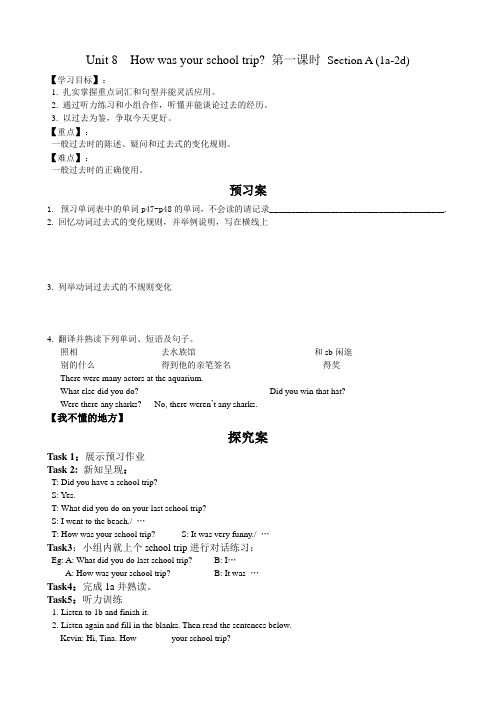
Unit 8 How was your school trip? 第一课时Section A (1a-2d)【学习目标】:1. 扎实掌握重点词汇和句型并能灵活应用。
2. 通过听力练习和小组合作,听懂并能谈论过去的经历。
3. 以过去为鉴,争取今天更好。
【重点】:一般过去时的陈述、疑问和过去式的变化规则。
【难点】:一般过去时的正确使用。
预习案1. 预习单词表中的单词p47-p48的单词,不会读的请记录________________________________________.2. 回忆动词过去式的变化规则,并举例说明,写在横线上_________________________________________________________________________________________________________________________________________________________________________________________________________________________________________________________________________________________________________________________________3. 列举动词过去式的不规则变化________________________________________________________________________________________ ________________________________________________________________________________________ ________________________________________________________________________________________ 4. 翻译并熟读下列单词、短语及句子。
- 1、下载文档前请自行甄别文档内容的完整性,平台不提供额外的编辑、内容补充、找答案等附加服务。
- 2、"仅部分预览"的文档,不可在线预览部分如存在完整性等问题,可反馈申请退款(可完整预览的文档不适用该条件!)。
- 3、如文档侵犯您的权益,请联系客服反馈,我们会尽快为您处理(人工客服工作时间:9:00-18:30)。
初级中学师生共用讲学稿课题:Unit 8 How was your school trip? Section B (3a-4)课型:新授课主备人:【学习目标】1. 通过自主学习,掌握重点单词、短语。
2.叙述过去发生的事情,并表达自己的观点、看法。
3.培养自己热爱大自然和生命及乐观的人生观。
【自学质疑】1.预习: P51页内容2.检测单词和重点短语:院子、庭院____________ 幸运地____________ 雨伞_________雨衣____________ 湿的潮湿的____________数字化视频光盘___________________ (短语)庭院旧货出售___________ 3.自主探究学习学习3a,听录音,矫正读音4、Read 3a and the answers to the two questions:1) How was Nick’s day off?_____________________________.2) What did Uncle Martin put in the yard? _________________________.我能从文章中找出并翻译下列短语及句子:1) take notes_______________________2) give your opinion about___________3)have fun camping________________4)all day ________________________5) have a yard sale ________________6)get wet _________________________7)How was your day off? ______________________________8) However, no one came to the sale because the weather was so bad.______________________________________________________9) Luckily, we brought our umbrellas and raincoats, so we did n’t get wet.__________________________________________________5、Read 3a & complete the chart .6、What do you think of Nick’s day off?I think/ I n my opinion…__________________7、读并补充完整3b中Tom写给Nick的回信,理解短文Imagine you are Tom; write the letter back to Nick.Dear Nick,Thanks for your letter. I’m sorry you didn’t have fun on your day off. My day off was __________, I went _________, and I visited _______________.It was ___________. W e saw _____________. I bought ________________.It was a really__________ day. See you soon.Y ours,Tom8、口头向组内其他同学汇报一下你上个假日所作的事How to write abo ut one’s day off?1) How was the weather? 2) ___________________________3) _________________________ 4) ________________________5) _____________________________ …【探究点拨】1.have fun doing sth 开心地做某事我们愉快地学习英语。
_________________________________________________.2.all day = the whole day3.have a yard sale昨天,他们进行了庭院旧货出售。
________________________________________.4.luckily(adv.)—lucky(adj.)—luck(n.)---反义词unluckily5. get wet ,get cold ,get warmer and warmer冬天来到,天气变得越来越冷。
________________________________________. 【当堂训练】一、写出下列动词的过去式visit ________ rain ________ stay ________ watch ________play ________ put ________ read ________ be ________have________ come _________ get ________go ________ buy ________二、. 翻译词组1) 在她的休息日_________________ 2)在学校旅行中__________________ 3) 观看海豚表演____________________ 4) 开车兜风____________________ 5) 弹钢琴______________________ 6)洗衣服________________________ 7) 帮爸爸妈妈的忙___________________ 8) 睡懒觉______________________9) 和朋友一起看电视_____________________10) 上课___________________三、用所给词的适当形式填空My last day offOn my last day off, I had fun shopping, I bought some _________. But on my way home, it suddenly _______. I forgo t to bring my _________. Luckily, I brough t an__________. So I didn’t __________. It was really an interesting day.四、完成句子:1)他们参观动物园,过的很愉快。
They ________________________________.2)上个星期天下了一整天雨。
Last Sunday it ______________________ .3)学生们把书拿出来放在了桌子上。
The students ______________________on the desk.4)下周他们将进行现场旧货销售。
Next week thay __________________________.5)昨天我们都淋湿啦。
Y esterday we ___________________.6)在我的假日里,我呆在家里整天看DVD.__________________ , I __________________________.五、单项选择1.________her day off, she had fun. A.In B. On C. At2. Look, she’s running_____the rain. A. in B. on C.at3. We went _________a drive yesterday. A. to B. for C. at4. ---What do you think of the music?---It______wonderful.A. smellsB. tastesC.sounds5. They had fun________shopping yesterday.A. goingB. to goC. went六.适当形式填空:1. They had fun _______(read) the story-books?2. My mother _______(get ) up early this morning.3. They_______(have)a great time last Saturday.4. She _________(buy) some books for her little brother two hours ago.5. –Look! What _____ he _____(do) ?—Oh, he ____ (play) baseball with his friends.6. They ________(take ) the bus to the city to see the football match yesterday.8. I didn’t want you _______ (buy) me a p en.9. He ________(buy) a book for me the day before yesterday.10. --______(be) you at your home yesterday evening? —No, I _____ in the office.七、选择适当的答语,将其答案序号填入题前括号内。
( ) 1.How was your last day off? a.Y es,I did.( ) 2.What did you do last night? b.No, she didn’t.( ) 3.Where did you go last Sunday? c.No,he didn’t.( ) 4.How was the weather that day? d.No,there wasn’t.( ) 5.What was in the yard? e.Y es,there were.( ) 6.Were there any pictures on the wall? f.There were some old things. ( ) 7.Was there an old house near the river? g.It was very interesting.( ) 8.Did you see the sharks? h.It was rainy.( ) 9.Did Carlons go to the aquarium? i.I went to the beach.( )10.Did Mary buy any gift? j.I stayed at home and watchedTV. 【教(学)后记】通过本节课的学习我最大的收获是___________________________________________________________________________ _______________________________________________________________感到自己有待加强的是__________________________________________________________________________________________________________。
